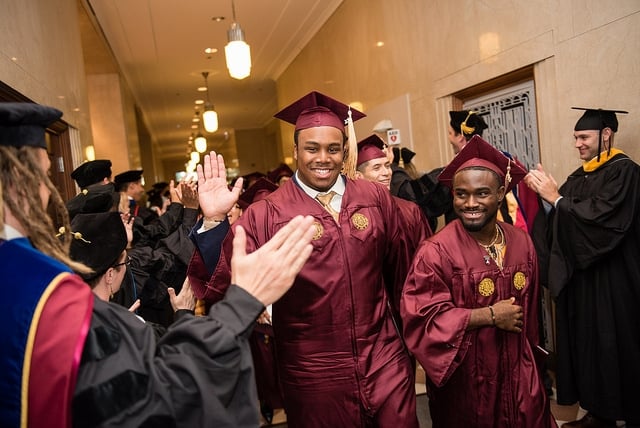You have /5 articles left.
Sign up for a free account or log in.

Arrupe College commencement
Arrupe College at Loyola University Chicago
A handful of religious institutions across the country are establishing or expanding two-year degree programs to provide a gateway to low-income students or an alternative for students looking for a nonsecular education as they pursue an associate degree.
Private two-year colleges are rare, with just about 200 in the country. Even rarer are private universities that offer associate degree programs.
But last year Yeshiva University, a Jewish institution located in New York, established a two-year program. In Minnesota, University of St. Thomas, a Roman Catholic institution, will do the same when the Dougherty Family College opens this fall. Meanwhile, Arrupe College, a two-year institution connected to Loyola University Chicago, recently graduated its first group of associate-degree holders. And Dordt College in Iowa, which is affiliated with the Christian Reformed Church, is now expanding its associate degree offerings to manufacturing technology and farm operations and management, or what it's calling "Pro-Tech."
"There's a common mission of wanting everyone to realize their full potential, and it takes different methods for people to realize their full potential," said Julie Sullivan, president of St. Thomas.
Shortly after becoming president of Dordt, Erik Hoekstra said, he spoke to families and potential students who wanted to attend a residential campus that also offered a religious curriculum. But the Iowa college didn't offer vocational majors.
"As a college in northwest Iowa, these two programs give us a real opportunity to take advantage of our strength by being in a manufacturing and agricultural hub," said Joel Sikkema, director of the Pro-Tech program.
Dordt officials completed a feasibility study that included listening sessions with local business leaders to better understand industries for potential degree programs. They settled on manufacturing and agriculture but also identified automotive technology and allied health as potential future offerings, Sikkema said.
The new agriculture and manufacturing programs also include partnerships with area businesses to provide the 30 students who have enrolled so far with internships.
Annually the annual cost of attendance for Dordt's four-year students is about $30,000, however, the net price for the college's two-year students is about $16,000 per year, Hoekstra said.
"On one hand it's substantially lower than a lot of sticker prices, but on the other hand it's somewhat larger of a net price than a community college or vocational school," he said. "We found a place in the middle that provides value to students and gives them the attributes of a college like this. They'll also have two days a week free to do educational internships with compensation, and they'll earn a substantial portion over a two-year period … we hope they earn in the neighborhood of $15,000."
Dordt has offered associate degree programs since it first opened in 1955 as a two-year college. But the new degrees focus more on the hands-on, vocational or technical skills that have traditionally been offered at community colleges.
"In no aspect of this are the students and the careers they're pursuing second-class citizens in relation to God or the U.S. economy," Sikkema said. "They'll be integrated on the campus. They'll be in the dorms just like other students."
Meanwhile, in Minnesota, St. Thomas's Dougherty Family College has enrolled more than 80 students for the fall. Nearly all of those students are participating in a summer enrichment program to help them prepare for the adjustment to college life.
For St. Thomas, starting a two-year program was about providing a more affordable alternative to low-income families. The average expected financial contribution from students attending Dougherty is about $1,000.
"I told them they're the inaugural class and now they're on the journey to co-creating this college with us," Sullivan said. "We'll learn a lot of things with them and continue to adapt and change to better meet their needs."
A Religious Mission
For each of the religious institutions that have started or expanded their two-year programs, officials view the initiatives as central to their missions.
"For us, it goes back to how we were founded," Sullivan said. "There is a certain part of our Catholic roots that talk about an opportunity for promotion, of respect and dignity for all, and an obligation to help all find an opportunity for education and jobs."
At Dordt, there's the belief that people are called not only to become missionaries or pastors, but also farmers, truck drivers, engineers or whatever profession interests them, Hoekstra said.
"Religious institutions use a lot of social justice language," said Reverend Steve Katsouros, dean and executive director of Arrupe. "This kind of puts some meat on those bones."
Katsouros said he believes Arrupe was the first of the handful of private institutions that moved in this direction when it opened in 2015. Two weeks ago the inaugural class of more than 70 students graduated from the college, which offers a lower price point than Loyola. Tuition to attend Arrupe is about $13,000 a year, but with grants and scholarships, students contribute about $1,300, he said.
"Universities like Loyola, we charge $42,000 in tuition and that's leaving a lot of folks behind," Katsouros said. "I think we miss out on an important demographic. [Arrupe] is mostly first-generation students who have a lot of drive, a lot of motivation, grit and resistance."








